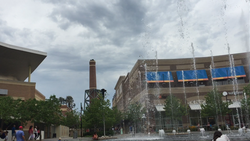Kansas City, Kansas
| Kansas City, Kansas | ||
|---|---|---|
| City | ||

The fountains at the Kansas Legends Outlets in the Village West district in Kansas City, Kansas
|
||
|
||
| Nickname(s): "KCK" | ||
 Location within Wyandotte County and Kansas |
||
| Coordinates: 39°6′24″N 94°40′35″W / 39.10667°N 94.67639°WCoordinates: 39°6′24″N 94°40′35″W / 39.10667°N 94.67639°W | ||
| Country | United States | |
| State | Kansas | |
| County | Wyandotte Leavenworth | |
| Incorporated | 1872, 1886 | |
| Government | ||
| • Mayor | Mark Holland | |
| Area | ||
| • Total | 128.38 sq mi (332.50 km2) | |
| • Land | 124.81 sq mi (323.26 km2) | |
| • Water | 3.57 sq mi (9.25 km2) | |
| Elevation | 869 ft (265 m) | |
| Population (2010) | ||
| • Total | 145,786 | |
| • Estimate (2013) | 148,483 | |
| • Density | 1,100/sq mi (440/km2) | |
| Time zone | CST (UTC–6) | |
| • Summer (DST) | CDT (UTC–5) | |
| ZIP Code | 66101-66113, 66115, 66117-66119, 66160 | |
| Area code | 913 | |
| FIPS code | 20-36000 | |
| GNIS feature ID | 0478635 | |
| Website | wycokck.org | |
| Kansas City | |
|---|---|
| Crime rates* (2012) | |
| Violent crimes | |
| Homicide | 15 |
| Robbery | 277 |
| Aggravated assault | 500 |
| Total violent crime | 877 |
| Property crimes | |
| Burglary | 1,772 |
| Larceny-theft | 4,558 |
| Motor vehicle theft | 1,208 |
| Arson | 69 |
| Total property crime | 7,538 |
|
Notes
*Number of reported crimes per 100,000 population.
2012 population: 147,201
Source: 2012 FBI UCR Data |
|
Kansas City (often abbreviated as "KCK" to differentiate it from Kansas City, Missouri) is the third-largest city in the state of Kansas, the county seat of Wyandotte County, and the third-largest city of the Kansas City metropolitan area. It is part of a consolidated city-county government known as the "Unified Government". Wyandotte County also includes the independent cities of Bonner Springs and Edwardsville. As of the 2010 census, the city had a population of 145,786 residents. It is situated at Kaw Point, which is the junction of the Missouri and Kansas rivers.
In October 1872, "old" Kansas City, Kansas, was incorporated. The first city election was held on October 22 of that year, by order of Judge Hiram Stevens of the Tenth Judicial District, and resulted in the election of Mayor James Boyle. The mayors of the city after its organization were James Boyle, C. A. Eidemiller, A. S. Orbison, Eli Teed and Samuel McConnell. In June 1880, the Governor of Kansas proclaimed the city of Kansas City a city of the second class with Mayor McConnell present.
In March 1886, "new" Kansas City, Kansas, was formed through the consolidation of five municipalities: "old" Kansas City, Armstrong, Armourdale, Riverview, Wyandotte. The oldest city of the group was Wyandotte, which was formed in 1857 by Wyandot Native Americans and Methodist missionaries.
In the 1890s, the city saw an explosive growth in population as a streetcar suburb of Kansas City, Missouri, from which it takes its name; this growth continued until the 1930s. It was one of the nation's 100 largest cities for many U.S. Census counts, from 1890 to 1960, including 1920, when it had a population of over 100,000 residents for the first time.
...
Wikipedia

